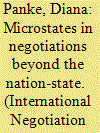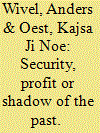| Srl | Item |
| 1 |
ID:
105188


|
|
|
|
|
| Publication |
2011.
|
| Summary/Abstract |
Malta, Cyprus and Luxembourg are sovereign states with less than one million inhabitants and, consequently, are often referred to as "microstates." This article inquires into the negotiation activities and conditions for success of microstates in negotiations beyond the nation-state. It develops a set of hypotheses on negotiation activity and on negotiation success and tests them qualitatively by drawing on the example of day-to-day negotiations in the European Union. Luxembourg is considerably more active than Malta and Cyprus. This is due to differences in domestic coordination practices (performance and cooperation between lead ministries and Permanent Representations), as well as different negotiation styles (proactive vs. reactive). Microstates can be influential, if they actively participate in negotiations for issues of high importance and if they select effective strategies in the given setting. Thus, microstates can sometimes turn into successful shapers of law beyond the nation-state - despite their slimmer administrations, fewer staff and - on average - negligible bargaining power.
|
|
|
|
|
|
|
|
|
|
|
|
|
|
|
|
| 2 |
ID:
098882


|
|
|
|
|
| Publication |
2010.
|
| Summary/Abstract |
Which factors determine the security strategies of microstates? Many microstates are either secluded island states or have very close political, economic and cultural ties to a larger neighbouring 'protector state'. They have had, therefore, little use for more traditional alliance arrangements. However, the patterns of security cooperation between states have shifted as the significance of flexible ad-hoc coalition-building as a means to coordinate international interventions has increased. Consequently, the strategic security challenges and opportunities for microstates have been transformed. Focusing on the Operation Iraqi Freedom coalition, this article explores some of these challenges and opportunities. Three hypotheses regarding the decisions made by the respective microstates to join international ad-hoc coalitions are studied: (1) participation provides increased security, (2) participation provides economic gains, and (3) participation reflects the lessons of past security challenges. The explanatory powers of each hypothesis are examined using a comparative case study of 11 Pacific microstates.
|
|
|
|
|
|
|
|
|
|
|
|
|
|
|
|